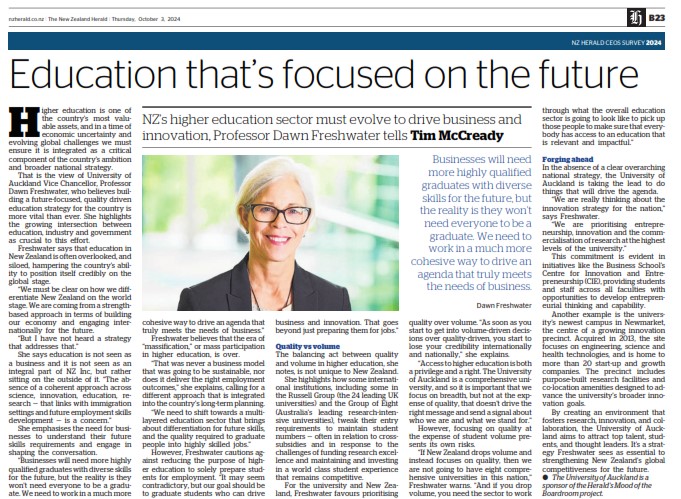Higher education is one of the country’s most valuable assets, and in a time of economic uncertainty and evolving global challenges, we must ensure it is integrated as a critical component of the country’s ambition and broader national strategy.
That is the view of the University of Auckland vice-chancellor, Professor Dawn Freshwater, who believes building a future-focused, quality-driven education strategy for the country is more vital than ever. She highlights the growing intersection between education, industry and Government as crucial to this effort.
Freshwater says education in New Zealand is often overlooked, and siloed, hampering the country’s ability to position itself credibly globally.
“We must be clear on how we differentiate New Zealand on the world stage. We are coming from a strength-based approach in terms of building our economy and engaging internationally for the future.
“But I have not heard a strategy that addresses that.”
“The absence of a coherent approach across science, innovation, education, research — that links with immigration settings and future employment skills development — is a concern.”
She emphasises the need for businesses to understand their future skills requirements and engage in shaping the conversation.
“Businesses will need more highly qualified graduates with diverse skills for the future, but the reality is they won’t need everyone to be a graduate. We need to work in a much more cohesive way to drive an agenda that truly meets the needs of business.”
Freshwater believes the era of “massification,” or mass participation in higher education, is over.
“That was never a business model that was going to be sustainable, nor does it deliver the right employment outcomes,” she explains, calling for a different approach that is integrated into the country’s long-term planning.
“We need to shift towards a multi-layered education sector that brings about differentiation for future skills, and the quality required to graduate people into highly skilled jobs.”
However, Freshwater cautions against reducing the purpose of higher education to solely prepare students for employment. “It may seem contradictory, but our goal should be to graduate students who can drive business and innovation. That goes beyond just preparing them for jobs.”
Quality vs volume
The balancing act between quality and volume in higher education, she notes, is not unique to New Zealand.
She highlights how some international institutions, including some in the Russell Group (the 24 leading UK universities) and the Group of Eight (Australia’s leading research-intensive universities), tweak their entry requirements to maintain student numbers — often concerning cross-subsidies and in response to the challenges of funding research excellence and maintaining and investing in a world-class student experience that remains competitive.
For the university and New Zealand, Freshwater favours prioritising quality over volume. “As soon as you start to get into volume-driven decisions over quality-driven, you start to lose your credibility internationally and nationally,” she explains.
“Access to higher education is both a privilege and a right. The University of Auckland is a comprehensive university, and so it is important that we focus on breadth, but not at the expense of quality, that doesn’t drive the right message and send a signal about who we are and what we stand for.”
However, focusing on quality at the expense of student volume presents its own risks.
“If New Zealand drops volume and instead focuses on quality, then we are not going to have eight comprehensive universities in this nation,” Freshwater warns.
“And if you drop volume, you need the sector to work through what the overall education sector is going to look like to pick up those people to make sure that everybody has access to an education that is relevant and impactful.”
Forging ahead
In the absence of a clear overarching national strategy, the University of Auckland is taking the lead to do things that will drive the agenda.
“We are really thinking about the innovation strategy for the nation,” Freshwater says.
“We are prioritising entrepreneurship, innovation and the commercialisation of research at the highest levels of the university.”
This commitment is evident in initiatives such as the Business School’s Centre for Innovation and Entrepreneurship (CIE), providing students and staff across all faculties with opportunities to develop entrepreneurial thinking and capability.
Another example is the university’s newest campus in Newmarket, the centre of a growing innovation precinct. Acquired in 2013, the site focuses on engineering, science and health technologies, and is home to more than 20 start-up and growth companies. The precinct includes purpose-built research facilities and co-location amenities designed to advance the university’s broader innovation goals.
By creating an environment that fosters research, innovation, and collaboration, the University of Auckland aims to attract top talent, students, and thought leaders. It’s a strategy Freshwater sees as essential to strengthening New Zealand’s global competitiveness for the future.
The University of Auckland is a sponsor of the Herald’s Mood of the Boardroom project
